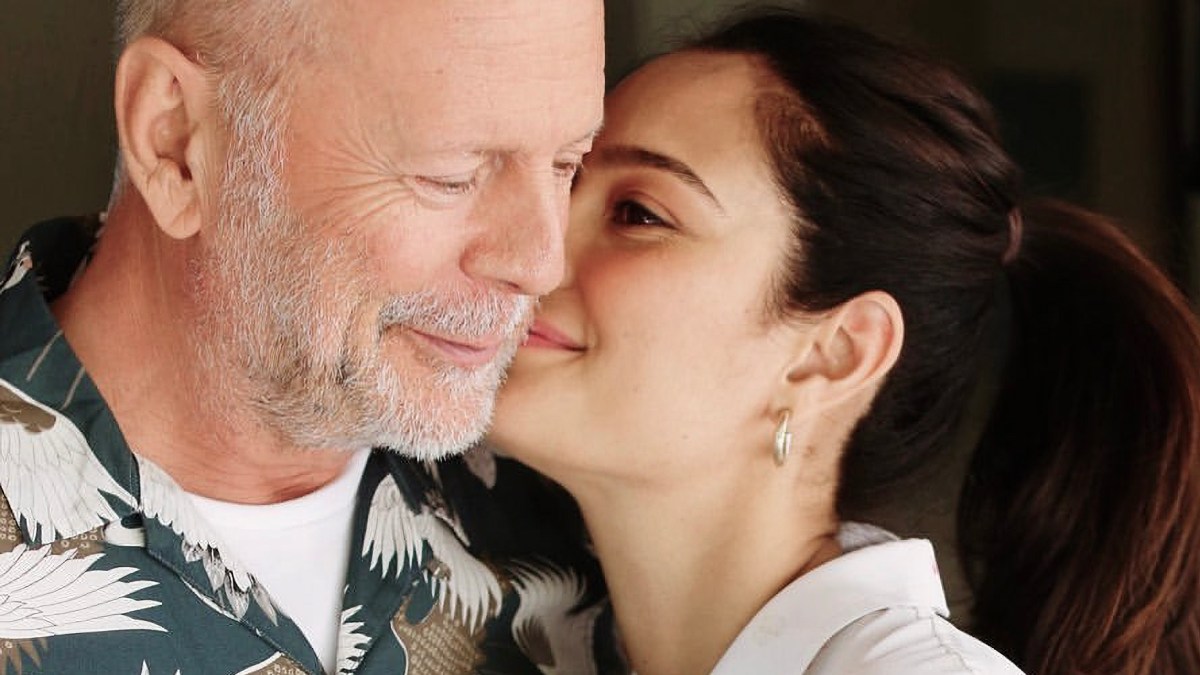It is difficult for Emma Heming Willis to pinpoint when it started, the slow altering of her husband’s brain, like objects in a room being moved one by one until the morning comes when you realise the whole place is different. “It just wasn’t Bruce,” says Heming Willis, 47, recalling the months before they had a diagnosis. “It just wasn’t the man that I married. It was like waking up with someone else.”
In November 2022 she sat in a doctor’s office in Los Angeles with her husband of nearly 14 years, the Hollywood action man and father of five Bruce Willis, then 67. “Frontotemporal dementia, primary progressive aphasia,” the doctor said as they looked at a brain scan. Heming Willis went into freefall.
Frontotemporal dementia, or FTD, is the most common form of dementia for people under 60. It is a degenerative brain disease that affects behaviour and personality, including the loss of empathy, inhibition and judgment. There is no treatment or cure. Primary progressive aphasia is a type of FTD that causes the degeneration of language and understanding.
She left the appointment with a pamphlet, unsure if anything had registered with her husband. A friend drove them home to nearby Brentwood, with Willis in the front passenger seat and his wife sitting behind him, looking out of the window, disorientated and bereft. “I was just trying to figure out what happens next,” she says. “What do I do now? How do I do this?” Three months later, in February 2023, Heming Willis made a public announcement of his diagnosis alongside their two daughters, Mabel, now 13, and Evelyn, 11, as well as Willis’s ex-wife, the actress Demi Moore, and her three adult daughters with Willis, Rumer, Scout and Tallulah.
In the two years since the family has bound tightly around Willis as the unrelenting disease makes its way through his brain. In the photographs they shared on social media, Willis, 70, looks gentle, blissed out, almost of another place. It is far from the man who for many is the definitive all-American hunk, with a career spanning four decades and more than 130 movies, notably Die Hard, in which he crunches across broken glass barefoot and fires machineguns into the air (“Yippee-ki-yay, motherf***er!”).
Now Heming Willis describes herself as his “caring partner”. She is shy, softly spoken, a former model who was pulled in by Willis’s magnetism and carried along by his propulsive energy. She says the reality of caring has been shattering, even with their enormous resources. The main source of comfort she has found is in becoming a dementia campaigner. Her diary is filled with speaking events and fundraisers.
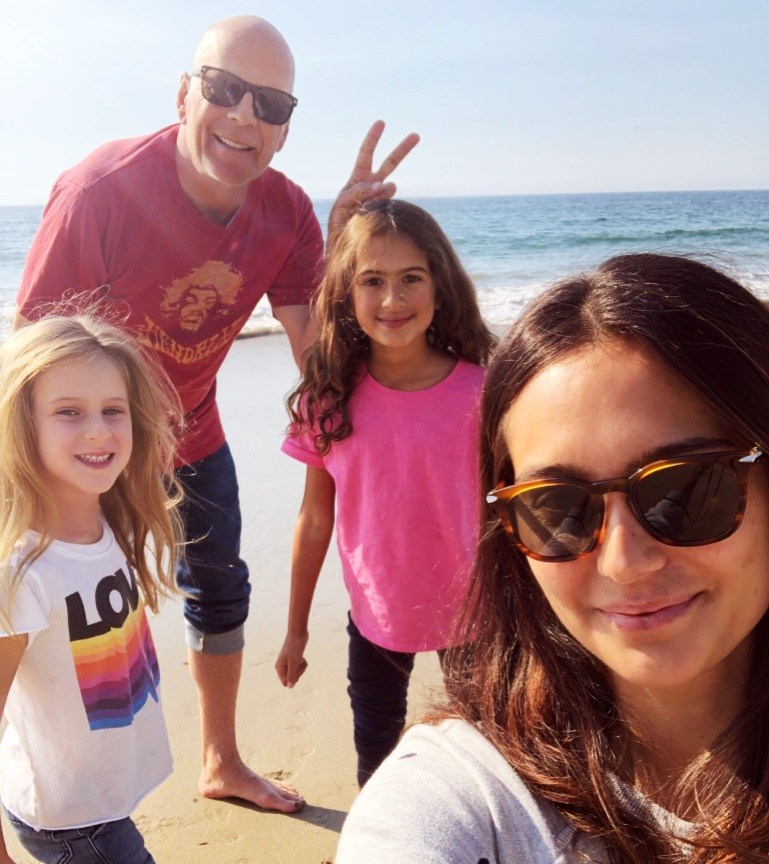
Bruce and Emma on the beach near their home in Brentwood, Los Angeles, with their daughters Evelyn, left, and Mabel, October 2019
COURTESY OF EMMA HEMING WILLIS
She has also written a book, The Unexpected Journey, to raise awareness of the illness. It is part guide for carers — how to talk to your children, how to look after yourself — and part memoir of her husband, an account of grieving for a person fading away, while loving deeply the person still there.
“Bruce and I now have our own language, our own way to be with each other,” Heming Willis says. “It’s just about sitting with him, walking with him, listening to him as he tries to verbalise in his own language. Hearing him, validating him. You know ” She stops herself, crying gently. “I’m sorry ”
She is sitting in the family home in Los Angeles, her dark hair pulled back. She wears wire-framed glasses, her skin glowing and make-up free. Behind her there are family photos and shelves full of books about dementia, caring and dying. “It’s hard,” she continues. “FTD is just an unkind disease — it constantly takes. Even when you think it can’t take any more, it takes a little more.”
Unlike Alzheimer’s, FTD is not a disease that makes you forget your family — rather it stops you being able to communicate with them. “Bruce’s disease, I believe, has given him this one grace: to not know what FTD is,” Heming Willis writes. Still, she is mindful of the information she gives about his precise medical state, being careful to balance privacy with a desire to help others. She wants to help relieve people of the shame she has felt herself — for frustration and resentment at their new life; for not having seen the signs of his disease earlier; for hiring professional carers; for having the resources to do so.
She says that “one of the hardest decisions I ever had to make” was to move Willis into a second, separate family home down the street. This is an alternative to being in a care home, an arrangement that means Willis can receive 24-hour treatment, their young daughters are able to live in a house where they can be children and make noise, and one that gives Heming Willis a break from being a carer. “But among the sadness and discomfort, it was the right move — for him, for our girls, for me,” she says. “Ultimately I could get back to being his wife. And that’s such a gift.”
The second home also provides Willis with some measure of independence. His friends come round every Friday night for a “dude hangout”. She continues: “It’s made such a difference for more friends and family to have their own experience with him without it being my home, without me hovering, or my anxiety of how to manage the guest and their expectations, and then have to see their reactions — their sadness at what is.”
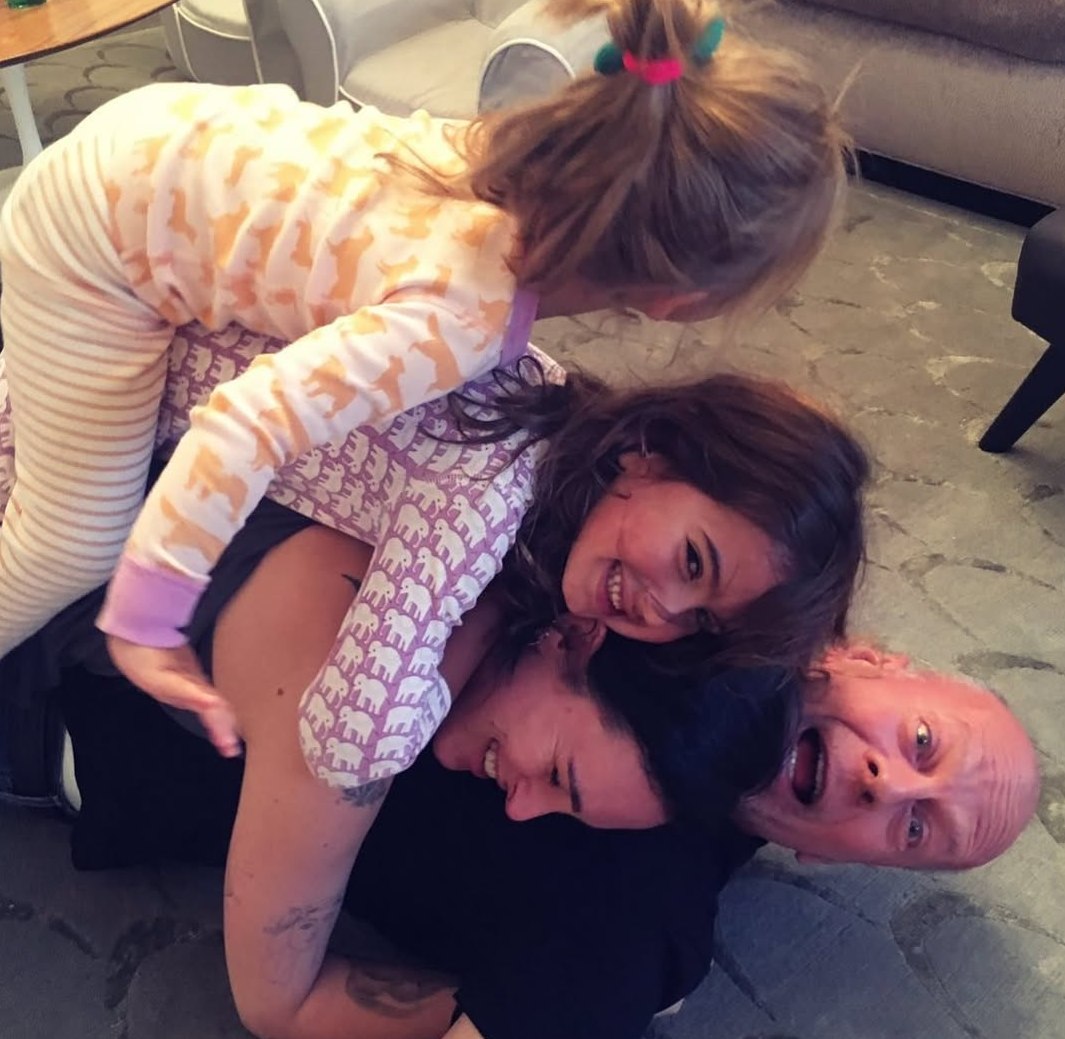
A family scrum on Father’s Day in June 2022
EMMA HEMING WILLIS / INSTAGRAM
When they come home from school, Mabel and Evelyn pile into the house and sit on their father’s lap, clambering over him, holding their faces against his, running around the garden as he watches from his chair. “You can see the tenderness of it,” she says. “The girls don’t need him to be this or do that. They have really adapted to his disease and they know how to move around him. It’s beautiful, but it’s hard for them. They miss him.”
Everyone seems to have a Bruce Willis story, says Heming Willis, who gets told them all the time — the one where he leapt behind the bar and served drinks to all the assembled guests; the one where he brought flowers to an eight-year-old’s dance recital.
Willis was born on the Idar-Oberstein US military base in West Germany, where his father, David, was stationed, and came from “a long line of blue-collar people”, he has said. When he was two the family relocated to Carneys Point in New Jersey, where his father became a factory worker and his mother, Marlene, worked in a bank. Willis struggled at school and was nicknamed “Buck-Buck” because of his stutter, which all but disappeared when he was on stage with his drama club. After high school he moved to New York City, working as a part-time bartender and auditioning for TV bit parts and off-Broadway productions.
And then came Willis’s big break. In 1984 he flew to Los Angeles and auditioned for the television series Moonlighting, a comedy drama about a failing detective agency. Such was Willis’s instant magnetism, the producer Glenn Gordon Caron told the Los Angeles Times in 1999, that when he walked down the office corridor “all the secretaries twitched”. He starred in all five seasons, winning a Golden Globe and a Primetime Emmy.
• Bruce Willis at 70: his 10 greatest films
The success of Die Hard in 1988 made Willis a household name, taking $140 million at the box office, and by the 1990s he was a gold-plated A-lister. He had met the megastar Demi Moore the year before the film was released, marrying her four months later in Las Vegas. The couple had three daughters and divorced in 2000. Moore wrote in her memoir, Inside Out, that Willis wanted stability of family while craving “novelty”. “Basically, he wanted to do whatever the f*** he wanted,” she added. “He was 36 at the time — and throw in celebrity and money? You do the math.”
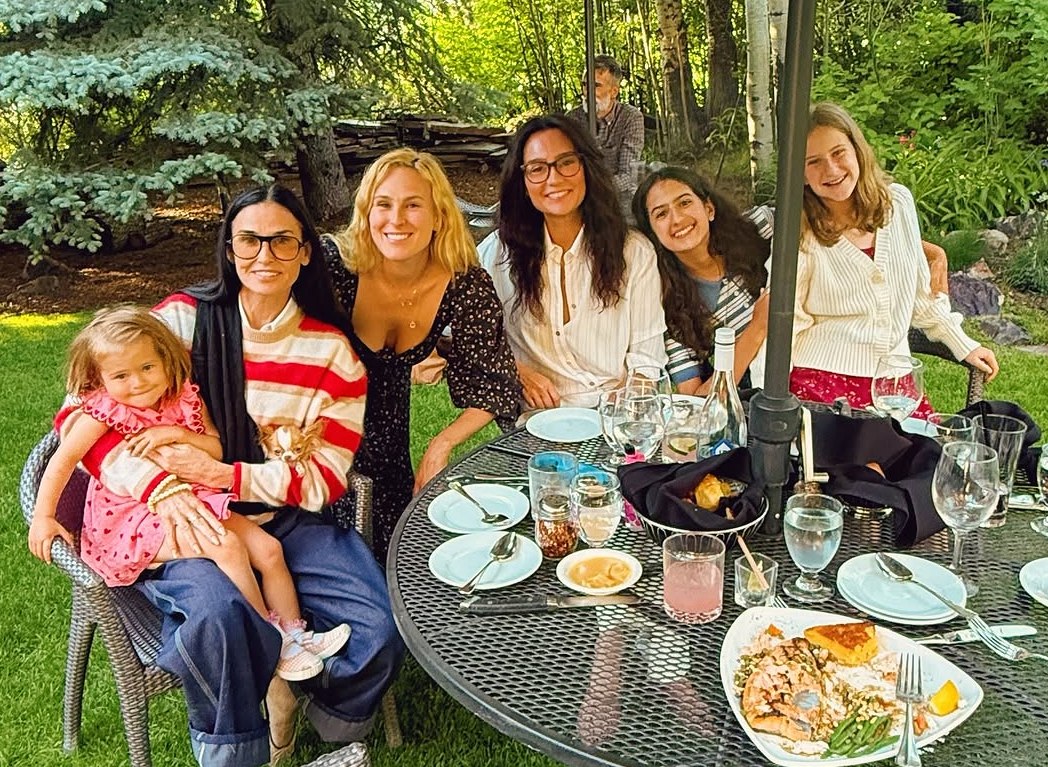
The extended family celebrate Emma’s birthday in June. From left: Demi Moore with her granddaughter, Louetta, and daughter Rumer Willis, Emma, Mabel and Evelyn
EMMA HEMING WILLIS / INSTAGRAM
When in 2003 Moore started dating Ashton Kutcher, another Hollywood heart-throb and 15 years her junior, Willis was so jealous that his fellow actor Will Smith gave him a talking-to. “He said, ‘Dude, you’ve got to do whatever it takes to get the kids and all the spouses or the girlfriend together. You’ve got to show your kids it’s OK,’ ” Willis told Playboy in 2007. “It was like a light went on. Ding. So Will, thanks.”
Moore has been open about their quirky but apparently harmonious set-up, saying that she and Willis were “more connected” after their separation than before.
Willis had some sophisticated career highs in the years after Die Hard, playing a sentimental boxing champ in Quentin Tarantino’s Oscar-winning 1994 hit Pulp Fiction and a child psychologist in The Sixth Sense (1999). There were also some big-budget flops in the 2000s with The Kid, Tears of the Sun and Perfect Stranger. These days his daughter Evelyn loves hearing his voice as RJ, a smooth-talking raccoon in the cartoon Over the Hedge (2006), while Mabel adores Wes Anderson’s Moonrise Kingdom (2012), in which her father plays a police officer who leads the search for two runaway kids.
“It’s really hard to look back at the old movies,” Heming Willis says. “Other times I get stuck in the iCloud, videos and pictures on our phones. But I walk away from it just feeling, ugh — like I can’t believe it. I can’t believe Bruce has this disease. I can’t believe what this disease has done to him.”
She was born in Malta. Her British father worked for an American oil company and moved the family to Lebanon, Saudi Arabia, Venezuela and Texas. She is an only child, and the family settled in California when she was seven. “I was a rule follower,” she says, “always wanting to do the right thing — a good kid.”
After her parents divorced, her mother, Zorina, scraped by as a cleaner, an assistant at a grocery store and later as an actor’s agent. In 1993, at 15 years old, she entered a supermodel competition in the UK run by Elle magazine and the TV show The Big Breakfast. She won and dropped out of high school in Orange County, California, to move with her mother to Tottenham, north London, where her mother’s family had emigrated from British Guiana decades before.
“It’s always been just my mom and me,” she says. “She was a single parent and there was so much she was trying to handle, so [modelling] was a way to help support us.” (Today her mother lives in Los Angeles, ten minutes away.)
Her work propelled her to New York City, where she bought an apartment in the West Village, appearing on the covers of Elle, Glamour and W magazines, as well as modelling for brands including Gap and La Senza. “I was doing very commercial stuff,” she says. “But I had a consistent career right through to my early thirties and a good reputation.”
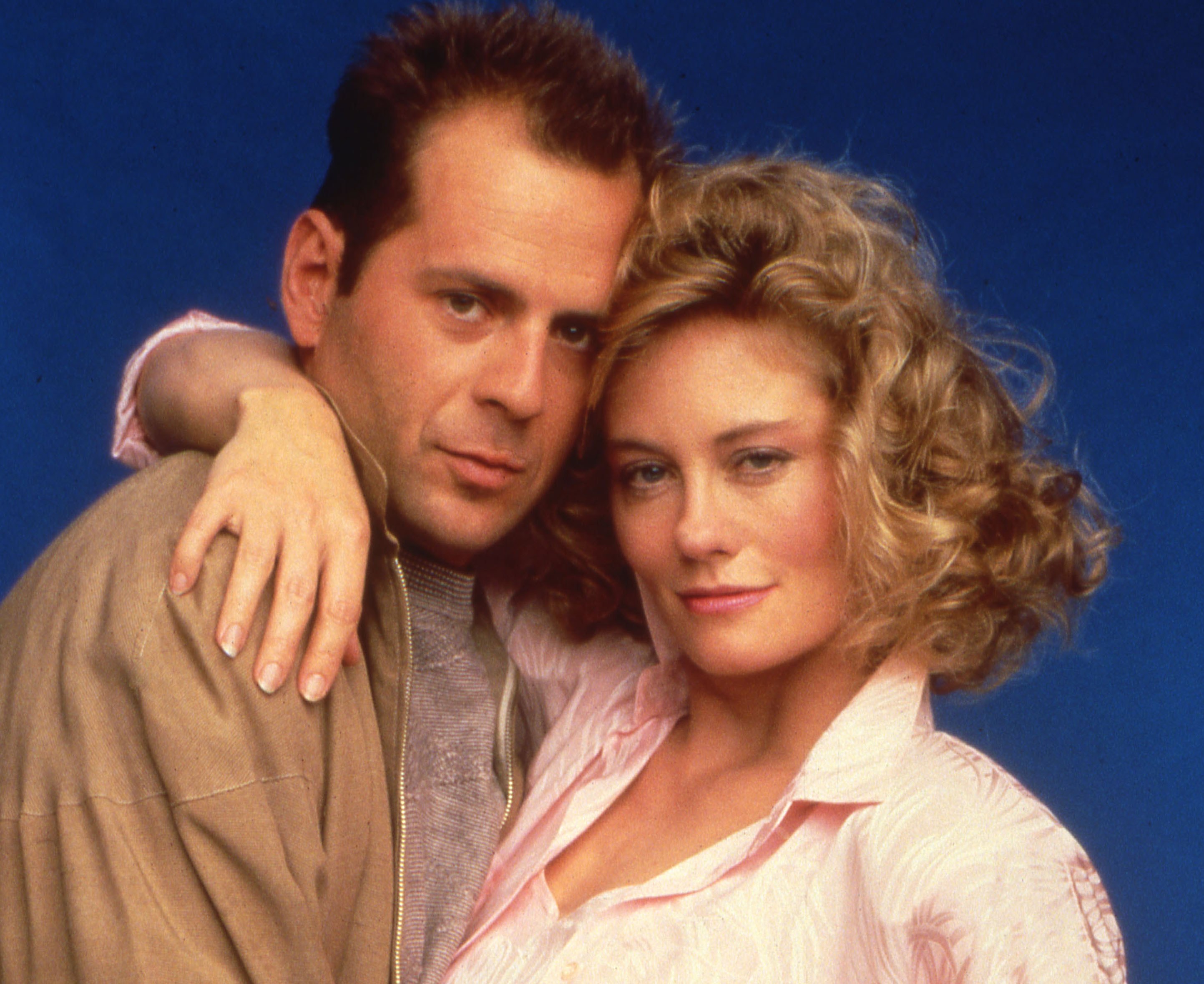
Willis with Cybill Shepherd in Moonlighting in the mid-1980s
ALAMY
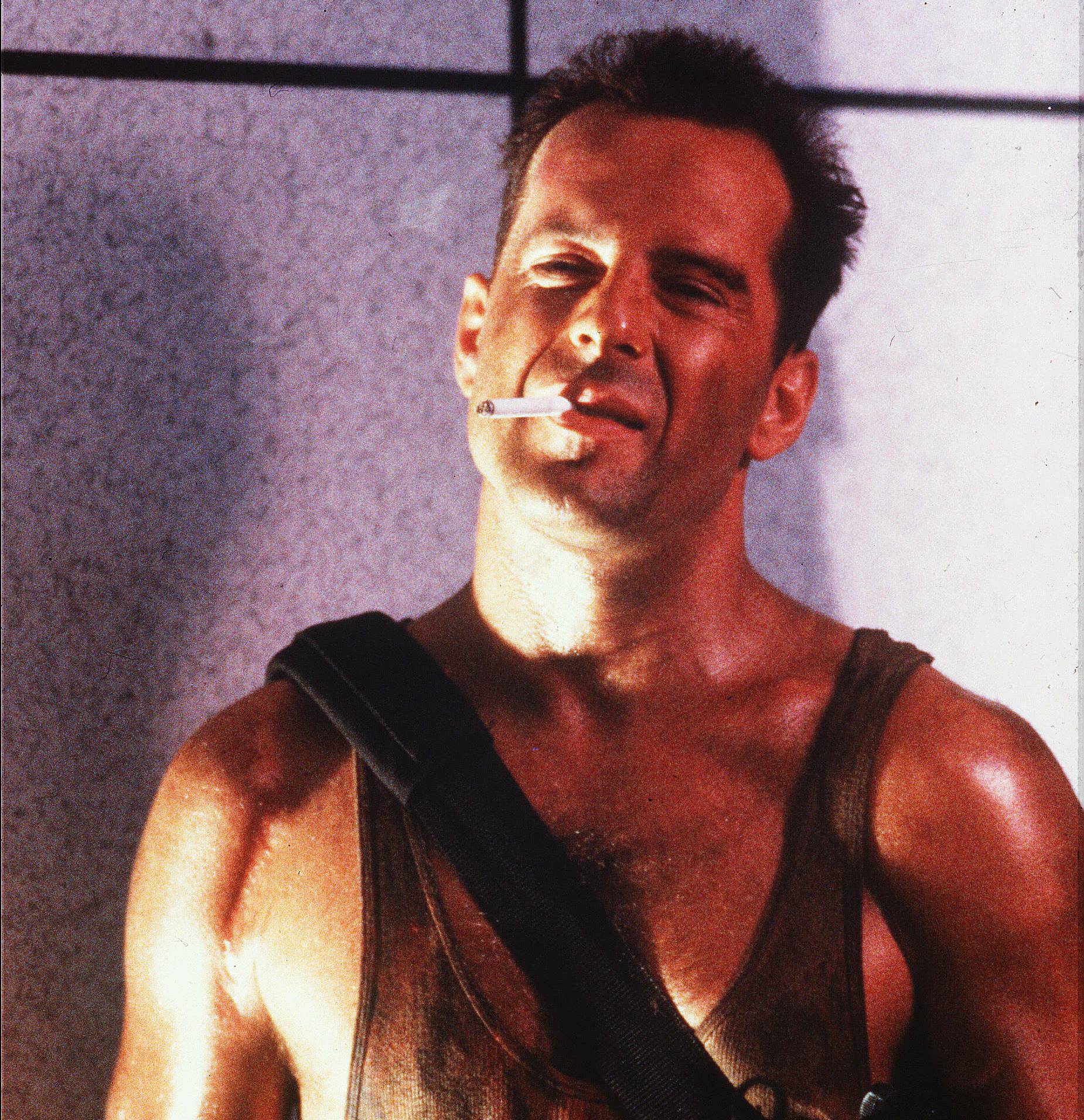
Die Hard (1988)
20TH CENTURY FOX
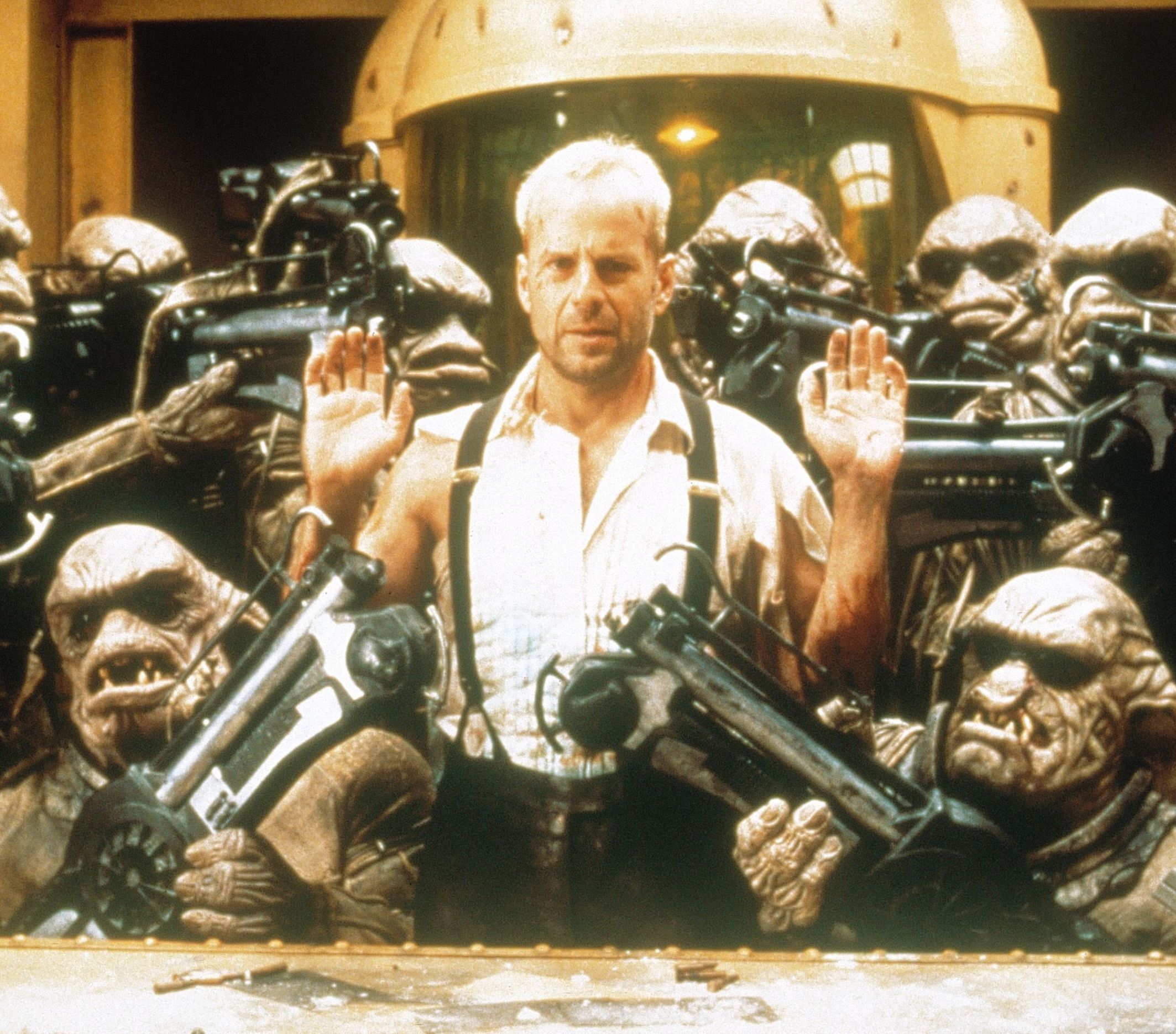
The Fifth Element (1997)
REX FEATURES
In 2005 she had a fitness class with her personal trainer in LA and while she was warming down Willis was warming up for his session. She knew who he was, of course, but says he wasn’t really “in my sphere”. Willis, however, felt sure about her. Almost two years later he read in the tabloids about her break-up with her fiancé at the time, a nightclub owner. He asked a mutual friend for her number and called. The night before she moved back to New York they went for dinner. Their phone calls continued.
Their next date was on New Year’s Eve in 2007, when Willis sent a private jet so she could get to his estate in the Turks and Caicos, where he was spending the holidays with his three daughters, Moore and Kutcher.
“I loved witnessing what that family looked like — different, in the sense of an ex-wife and her husband and just how [Willis] took that all in so effortlessly,” she says. “I’m so lucky that we have this blended family and it’s really because Demi and Bruce set it up for us to be able to thrive in this way, to be able to support each other.” Just over a year later she married Willis on the same island.
The couple were yin and yang; she was swept up by his vitality, made bolder by his boldness. “His charisma was something I’ve never seen before — just the level of confidence is extraordinary,” she says. “God, I hated going to parties with this guy.”
• Bruce Willis may not know he has dementia, says wife
At home he’d let his daughters eat ice cream for breakfast before they went to school, and he’d jump into the swimming pool, fully clothed, with them when they got home. “That is the energy that he brings, a love of life and to have fun and to make sure that people around him have fun. To him life was just big.” His motto was “live it up”.
And then, about five years ago, something in their relationship started to feel “off”. Conversations weren’t “lining up”. It felt like an “abstract, intangible” thing that wasdifficult to discuss with a doctor. “Thank goodness I knew who he was at his core — if I didn’t, I don’t know that I would have been able to stay in our marriage,” she writes. “No one suspects the diagnosis because most people have no clue what FTD is.”
At their big family dinners with his five daughters, wife and ex-wife, he would sit back, disengaged. They thought it was his hearing: he has partial deafness after firing a gun in Die Hard without wearing earplugs. But the household felt chaotic too, with Willis unable to “connect the dots that something was wrong”. One night their house alarm went off at 2am. Heming Willis paused, expecting her husband to go down as he always did. He did not stir. She ran downstairs and stood in front of the keypad, alone. In that moment it hit her, she says. She was losing him.
After various tests, doctors’ consultations and a “vague” diagnosis, they received the FTD diagnosis in 2022. The life expectancy from first symptoms of FTD is between six and eight years.
“Realising that there is no treatment, no cure,” Heming Willis says, “it was one of the most traumatic experiences, feeling completely alone.” She could not believe how many decisions there were to make, and she was paralysed by having to face them on her own. “I can’t ask him how he’s feeling, what’s wrong, or if something hurts,” she writes. “Instead I read his body language or look into his eyes to understand what’s bothering him and what he’s experiencing.”
Over the following year she built up an in-home care team, as well doctors and specialists, and is trying not to spiral into “doom and constant dread”, but to lean into the stillness and time she gets to spend with her husband.
“My life is this,” she says. “I’m always in it, it’s very hard to break away from it. I am always thinking about Bruce and his care and what else we can do. But this is dementia, so you are on solid ground and then something shifts and you have to figure out how to bring it back to stability again.”
• ‘My sister had the same disease as Bruce Willis — I watched her disappear’
The wider, blended family has been brought closer, Willis at the centre. “I really turn to my stepdaughters and Demi, and they really are helping me navigate this,” Heming Willis says.
She talks joyfully about the rare moments when she sees the old flash of adoration, a twinkle, when he is as he was. “We have these moments of connection all the time,” she says. “Do I think he knows, ‘Oh, this is Emma, and we’ve been married for this many years’? I don’t know what that process is for him. And when he puts his arms around me, it just feels like Bruce. It’s not different in that way. And that’s really, really beautiful and really, really heartbreaking.” She pauses. “It’s such a loss.”
In love with the new Bruce — by Emma Heming Willis 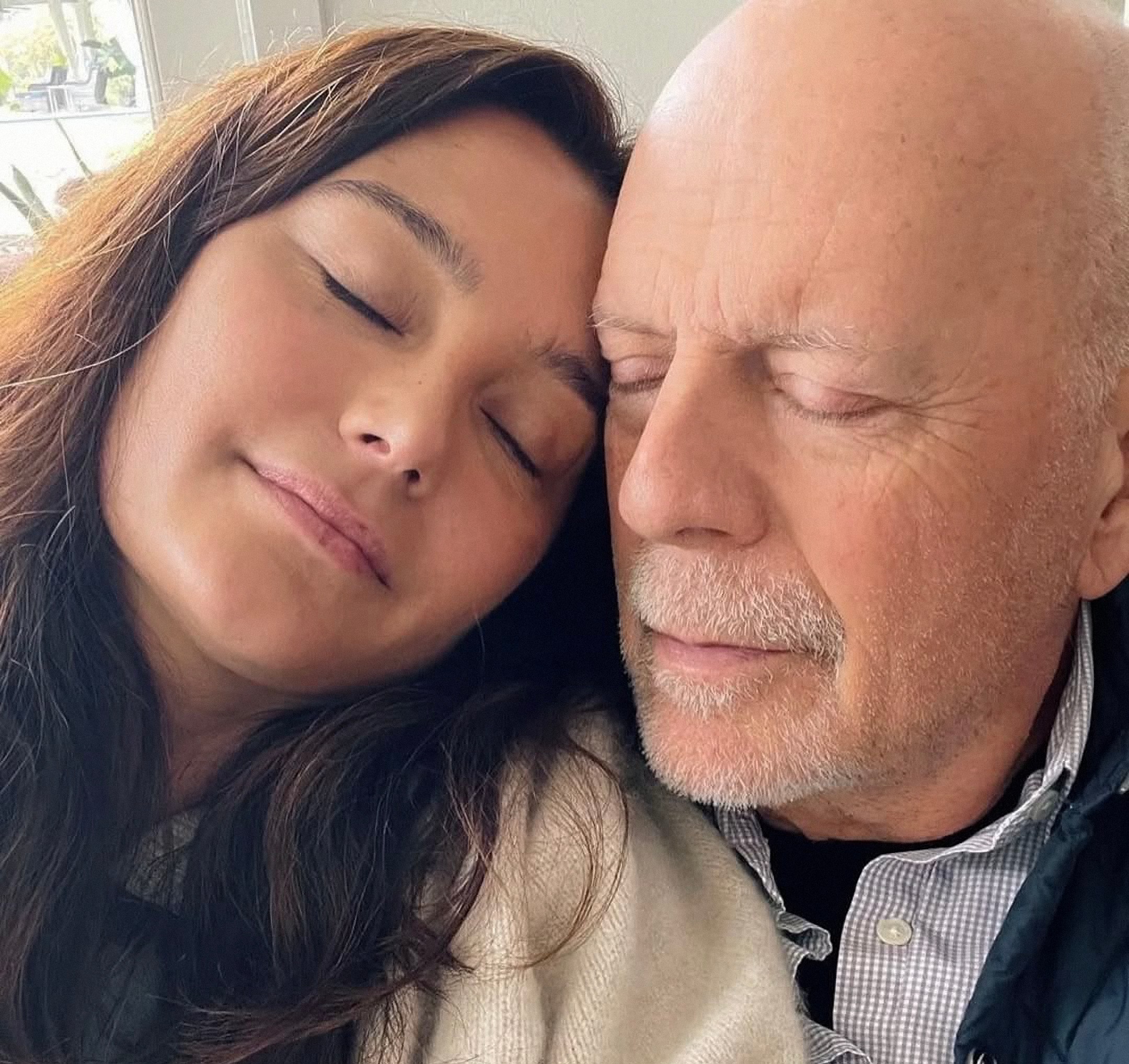
COURTESY OF EMMA HEMING WILLIS
My connection to Bruce now is different from when we started, but it’s also so much deeper. First, it’s beautiful to know and feel this kind of unconditional love and appreciation for my husband. Like the love a parent has for their children, it comes with no expectations. What I’ve realised is that prior to FTD, my relationship with Bruce had conditions — many conditions, in fact. I expected him to be my partner in every sense: to help plan for our future, be present and emotionally available not just for me but for all our children, and meet my needs in specific ways.
Before I knew that Bruce’s brain was slowly changing thanks to FTD, we went through a period where we struggled with a lot of miscommunications and an inability to connect, something so painful to me since we’d always seemed in sync. We didn’t seem aligned on our plans for the future any more, our traditions seemed to be falling by the wayside and our shared responsibilities became anything but, well, shared. All of this made me contemplate divorce.
When I realised that the changes in Bruce were caused by something beyond his control, I softened quickly. I then understood that the kind, caring and compassionate man I fell in love with was there the whole time. It was his disease that had started to take away the traits that made him him. I was able to forgive and forget, and I fell back in love with Bruce in a different, reimagined and unconditional way. What a gift that is, especially because I’d spent my whole life wanting to know and feel unconditional love with a partner.
Part of this is that my expectations have softened too. Before Bruce’s disease, he always made occasions like anniversaries and birthdays very extra. He’d send me dozens of roses. (Although I love flowers, I could never bring myself to tell him I don’t actually love roses because his intention was so sweet.) Or he’d make a dinner reservation at my favourite restaurant and order a beautiful bottle of cabernet because he knew I didn’t like champagne. I loved how Bruce celebrated everything in such a big way. It was wild and fun and a world I didn’t know before him. The difficult part was that he set the bar high for himself, so as his disease progressed he couldn’t keep up with it, and this was confusing and sad for me. Especially as he was the romantic in our relationship. Now, when our anniversary or my birthday rolls around, I no longer have the anticipation of what may happen. But the beauty of that is, we just get to be. I can sit with Bruce and appreciate the life and family we have created and tried to maintain. Yes, I mourn what was, but I also feel so grateful to experience a love that is limitless and comes with no expectations.
© Emma Heming Willis. Extracted from The Unexpected Journey: Finding Strength, Hope and Yourself on the Caregiving Path (Harper NonFiction £22). To order a copy go to timesbookshop.co.uk

